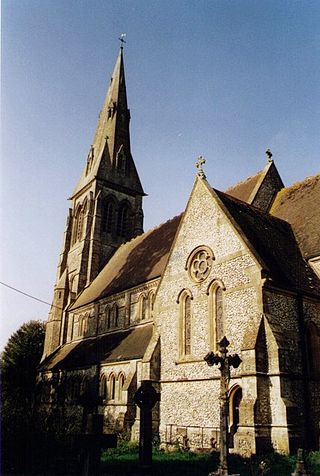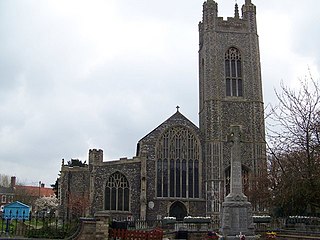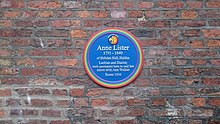
The Collegiate Church of the Holy and Undivided Trinity, Stratford-upon-Avon, is a Grade I listed parish church of the Church of England in Stratford-upon-Avon, Warwickshire, England. It is often known simply as Holy Trinity Church or as Shakespeare's Church, due to its fame as the place of baptism, marriage and burial of William Shakespeare. More than 200,000 tourists visit the church each year.

Anne Lister was an English diarist, famous for revelations for which she was dubbed "the first modern lesbian".
York had around 45 parish churches in 1300. Twenty survive, in whole or in part, a number surpassed in England only by Norwich, and 12 are used for worship. This article consists of a list of medieval churches which still exist in whole or in part, and a list of medieval churches which are known to have existed in the past but have been completely demolished.
Benjamin Ferrey FSA FRIBA was an English architect who worked mostly in the Gothic Revival.

St Wilfrid's Church is in Main Street, Melling, Lancashire, England. It is recorded in the National Heritage List for England as a designated Grade I listed building, and is an active Anglican church in the united benefice of East Lonsdale, the deanery of Tunstall, the archdeaconry of Lancaster and the diocese of Blackburn. Its benefice is combined with those of St Peter, Leck, St John the Baptist, Tunstall, St James the Less, Tatham, the Good Shepherd, Lowgill, and Holy Trinity, Wray.

Kendal Parish Church, also known as the Holy Trinity Church due to its dedication to the Holy Trinity, is the Anglican parish church of Kendal, Cumbria, England. It is recorded in the National Heritage List for England as a designated Grade I listed building.

Holy Trinity Church is a redundant Anglican church in the village of Coverham, North Yorkshire, England. It is recorded in the National Heritage List for England as a designated Grade II* listed building, and is under the care of the Churches Conservation Trust. The church stands near the ruins of the Premonstratensian Coverham Abbey, and not far from the River Cover.

Holy Trinity Church is a redundant Anglican church on Low Lane in the village of Wensley, North Yorkshire, England. The building is recorded in the National Heritage List for England as a designated Grade I listed building, and is under the care of the Churches Conservation Trust. Alec Clifton-Taylor included the church in his list of 'best' English parish churches.

Holy Trinity Church is a redundant Anglican church in the village of Blatherwycke, Northamptonshire, England. It is recorded in the National Heritage List for England as a designated Grade II* listed building, and is under the care of the Churches Conservation Trust. It stands in the grounds of the demolished Blatherwycke Hall.

St Martin's Church is a redundant Anglican church in the village of Waithe, Lincolnshire, England. It is recorded in the National Heritage List for England as a designated Grade I listed building, and is under the care of the Churches Conservation Trust. It stands in open countryside near the A16 road between Grimsby and Louth.

The Church of the Holy Trinity, Privett, is a redundant Anglican church in the parish of Froxfield and Privett, Hampshire, England. It is recorded in the National Heritage List for England as a Grade II* listed building, and is under the care of the Churches Conservation Trust.

St Mary's Church is a redundant Anglican church in the town of Bungay, Suffolk, England. The church and the ruins of the adjacent priory are recorded in the National Heritage List for England as a designated Grade I listed building, and are under the care of the Churches Conservation Trust. The church stands in the centre of the town on St Mary's Street, the A144 road.

Holy Trinity Church is a redundant Anglican church in the town of Halstead, Essex, England. It is recorded in the National Heritage List for England as a designated Grade II* listed building, and is under the care of the Churches Conservation Trust. The church stands to the north of the junction between Trinity Street and Chapel Hill.

Holy Trinity Church, Micklegate, York is a Grade I listed parish church in the Church of England in York.

Gentleman Jack is a historical drama television series created by Sally Wainwright for BBC One and HBO. Set in the 1830s in Yorkshire, it stars Suranne Jones as landowner and industrialist Anne Lister. The series is based on Lister's collected diaries—which run to an estimated 5 million words with about a sixth in secret code,—documenting a lifetime of lesbian relationships. Helena Whitbread began decoding and transcribing the diaries in the 1980s. Other transcribers have carried on the work. The research carried out for Wainwright’s Gentleman Jack amounts to hundreds of thousands of words of new transcription of the diary.

York Civic Trust is a membership organisation and a registered charity based in York, UK. Its primary function is to "preserve, protect and advise on the historic fabric of York". It is based in Fairfax House.
Ann Walker was an Englishwoman, married in Britain's first known lesbian wedding, to diarist and fellow Yorkshire landowner Anne Lister. Their union was solemnised by taking the sacrament together on Easter Sunday in 1834 at Holy Trinity Church, Goodramgate, York, which bears a commemorative plaque acknowledging the event. Walker inherited half of her family's estate, Crow Nest, located in Lightcliffe, West Yorkshire, near Shibden Hall, Lister's family estate, in Calderdale. Both women inherited their respective estates during the early 19th century, when primogeniture, the custom of granting lands and property to the oldest surviving son, dominated European law and society. They were travelling abroad together when Lister fell ill and died. Research into their diaries and letters suggest Walker may have experienced bouts of anxiety and depression throughout portions of her life.

Holy Trinity Church is a Roman Catholic parish church in Newcastle-under-Lyme, Staffordshire, England. It was built between 1833 and 1834, and designed by its priest, Fr James Egan in the Gothic Revival style. While it was described as "the finest modern specimen of ornamental brickwork in the kingdom" when it was built, Nikolaus Pevsner described it as "a crazy effort in blue brick." It is a Grade II* listed building, located on London Road close to the Grosvenor Roundabout.
The rainbow plaque programme is a UK scheme to create commemorative plaques to highlight significant people, places and moments in LGBTQIA+ history. Emulating established UK blue plaque programmes run by English Heritage, local authorities and other bodies, the first permanent rainbow plaque was unveiled in York in July 2018. Some UK LGBT locations are denoted by pink plaques, an idea that predated rainbow plaques.


















